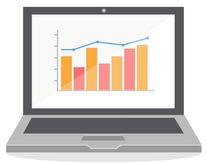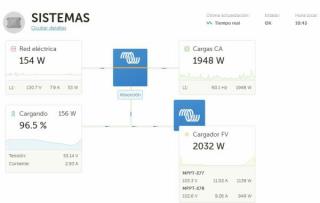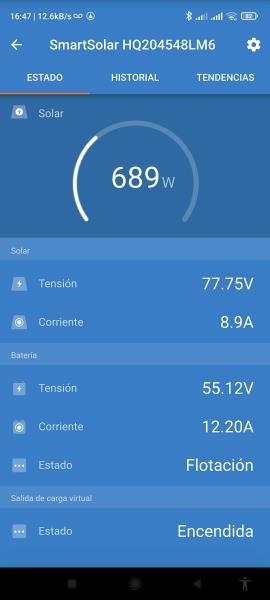Charge Controller MPPT
for Photovoltaic Systems
Victron Energy
Charge Controllers for solar energy
PWM and MPPT charge controllers are used to charge batteries with solar energy. Its main function is to recharge the batteries from the solar panels optimally, and to protect the batteries.
The PWM (Pulse Width Modulation) controller is essentially a switch that connects a solar panel to the battery. The result is that the voltage of the matrix will be reduced until it approaches that of the battery.
The MPPT (Maximum Power Point Tracking) controller is more sophisticated: it will adjust its input voltage to collect maximum energy from the solar panel and then transform this energy to supply the variable voltage requirement of the battery plus the load. Therefore, it essentially decouples the matrix and battery voltages so that there can be, for example, a 12V battery on one side of the MPPT charge controller and panels connected in series to produce 36V on the other.
El sol es nuestro aliado
Inversores - UPS para energía solar
CODESOLAR
ENERGIA
S. A.
GR
It is generally accepted that MPPT will outperform PWM, that is, with an MPPT regulator you "gain" between 10% to 30% more energy from the photovoltaic panels in relation to a PWM regulator.
In our experience, the MPPT regulator is visibly more efficient, when energy is needed most:
- In bad weather conditions, e.g. and. with dense clouds or rain, when the panels only produce a minimum of energy.
- In conditions of high ambient temperatures and/or high temperatures of the solar panels.
Other names of the charge controller:
Battery controller
solar regulator
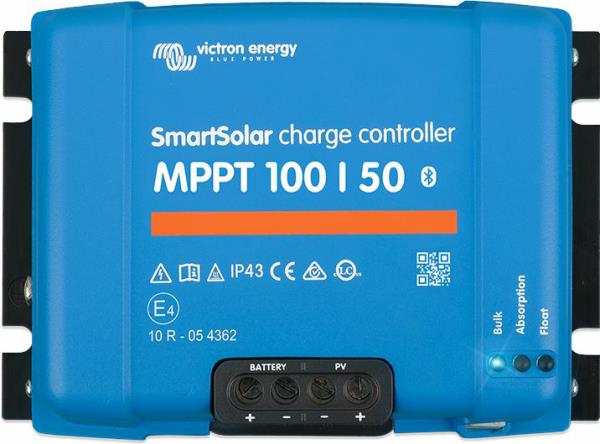
CodeSolarEnergia S. A. Comunicacion Desarrollo Tecnologia Energia Solar
Quito, Ecuador, Sudamerica
Configuration and control with VictronConnect
The RS SmartSolar solar charge controller can be remote controlled and configured via Bluetooth via the VictronConnect app. This allows you to configure and manage the device, obtain information at a glance, such as battery voltage and current, PV voltage and current, historical data and trends.
Remote monitoring and control
If the GX device is connected to the Internet, the Victron Remote Management (VRM) portal will give you access to the full power of your RS SmartSolar charge controllers.
If your installation is connected to a GX device and the Internet, the Victron Remote Management (VRM) portal will give you access to the full power of your MPPT, anytime, anywhere, for free.
In the case of remote installations, even when there is no internet connection available, you can monitor your MPPT by connecting the GlobalLink 520.
Additional units in chain
The RS SmartSolar solar charge controller has VE.Can bus ports. This allows communication with other RS SmartSolar and MPPT VE.Can units. The additional units simply “daisy chain” together with an RJ45 cable.
When connected to each other, the charge controllers will synchronize their charging phases. They can also send their data, through the same cable, to a GX device (such as the Cerbo GX) for monitoring.
Remote monitoring and control Victron Remote Monitoring VRM GX
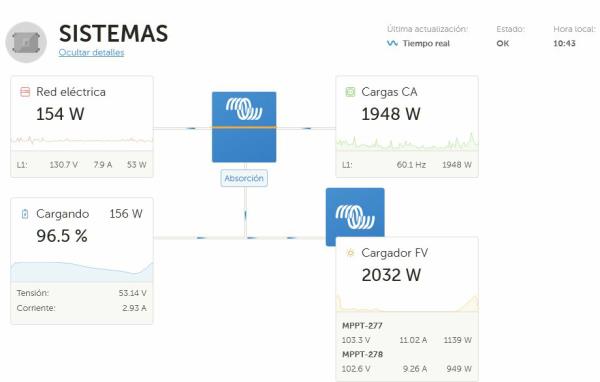
Seguimiento y control a distancia Victron Remote Monitoring VRM GX
Victron Smart MPPT Models
- Charge controller MPPT Victron Energy SmartSolar 20 A, 100 Voc
- Charge controller MPPT Victron Energy SmartSolar 20 A, 100 Voc
- Charge controller MPPT Victron Energy SmartSolar 35 A 150 Voc
- Charge controller MPPT Victron Energy SmartSolar 45 A, 150 Voc
- Charge controller MPPT Victron Energy SmartSolar 50 A, 100 Voc
- Charge controller MPPT Victron Energy SmartSolar 70 A, 150 Voc
- Charge controller MPPT Victron Energy SmartSolar 85 A, 150 Voc
- Charge controller MPPT Victron Energy SmartSolar 100 A, 250 Voc
- Charge controller MPPT Victron Energy SmartSolar 100 A, 150 Voc
- Charge controller MPPT Victron Energy SmartSolar 100 A, 450 Voc
- Charge controller MPPT Victron Energy SmartSolar 200 A, 450 Voc
Voc = Open Circuit input voltage of the photovoltaic panels
